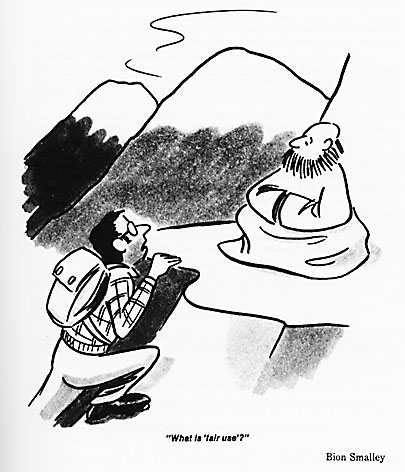Copyright Q&A
- What Does Copyright Mean?
- Copyright is the EXCLUSIVE RIGHT of an author or publisher to copy, publish, sell, perform, or otherwise distribute a piece of creative work.
- Why Does It Exist?
- By preventing others from copying and selling
creative work,
copyright allows the creator to make more money from his or her
work. Its purpose is not, however, to help out authors, but to
work for the public good by increasing the amount of "useful knowledge"
available. It's an irony of copyright that the means of
increasing production end up limiting distribution--which is why the
Founders specified that it should be for "a limited time" after which
all work would enter the public domain.
- What Is Covered by Copyright?
- Almost everything. Any copyrightable work (which now includes almost everything you can think of) is automatically protected by copyright as soon as it's produced--even if there's no © symbol or other label. This includes internet content.
- What Is Not Covered by Copyright?
- Anything in the public domain, which is the place where works whose copyrights have expired go to frolic. Since the Sonny Bono Copyright Extension Act of 1998, individual authors recieve exclusive rights for the rest of their natural lives, plus 70 years afterwards. So today's public domain is full of old-geezer works created before 1930 (except some, that have gotten extra-special protection). The public domain also includes all FACTS (nobody can copyright the multiplication table or the basic US map) and IDEAS (it's the EXPRESSION of them that gets protection--so if you come up with a brilliant way to make a million dollars and you tell it to your neighbor and he puts it into practice and actually makes a million dollars, he doesn't have to give you sqat for having the idea).
- How Do I Know What's in the Public Domain?
- Ask your Magic 8 Ball. There isn't any established system, though some copyright cowboys and girls are working on it.
- What Can I Do With Uncopyrighted Work?
- Copy it, distribute it, sell it, post it on the web, perform it, anything you like (except for trying to pass it off as your own).
- What Can I Do with Copyrighted Work?
- As an individual, you can do pretty much what you like: read it, hang it on your wall, burn it, draw mustaches and horns on it. You can write quotations on your blackboard, make parodies, provide links to websites, and of course give away or lend individual copies of purchased material. Also, if you ask permission from the copyright holder and get it, you can do whatever they will allow.
- What Is Fair Use?
- Fair Use is what you do when you're doing something with a copyrighted work, and you haven't asked permission, but it's still legal. Such uses include quoting passages in a book review, photocopying an article from Us Weekly for your files, reproducing images, sounds, or words in the context of a parody, or making a mix tape, if anyone does that anymore. Educators and librarians get some special fair uses. You can copy that Us Weekly article for your whole class if you like. You can have your students act out all of The Phantom of the Opera without paying any royalties. (This kind of thing seems obvious, but keep this in mind: ASCAP actually wanted to sue the Girl Scouts because some of the songs they sang around the campfire were copyrighted. Fortunately public ridicule made ASCAP back down.)
- So What Is Fair Use?
- There's actually no concrete definition in the
law, just
precedents set by court cases, which you certainly don't want to hear
all about. Something is more likely to be considered fair
use if it's for educational purposes, if nobody's making a profit from
it, and most importantly if you don't (even potentially) cut into the
publisher's market. Anything that you
use only in your classroom is likely to be fair (except for
multiple copies made to replace purchases); it's when you post things
on the web and make it publicly available that you are "publishing" and
therefore risking infringement. If only your students can access
your website, on the other hand, your website is acting like your
classroom bulletin board and it isn't likely to be infringing.
- Is It OK to Download Music from the Internet?
- We're not going to discuss that now.
- So What Should I Do?
- You should focus on educating to the best of your ability. Other than that, some guidelines:
- Avoid copying or posting large portions of works.
- Ask permission of the copyright holder when posting on the internet.
- See if you can create a password-controlled or
otherwise
non-public website.
- Provide source citations.
- Have clear educational goals for any copying you do.
- Check to see if your school or district has a
specific policy.
-
Did You Make Sure All
Your
Uses of Images on this Page Are Considered Fair Use?
Nope. I'm taking my chances.
Depends on how dorky your sense of humor is. Here are some attempts:


Where Can I Go to Learn More?
- Here's a handy, printable chart of what you can do with different types of resources. These are guidelines, not laws, and some people think they're too limiting. You'll have to make your own decision. Copyright Chart
- Here's an article that goes a little further in
depth.
www.electronic-school.com/0698f45.html